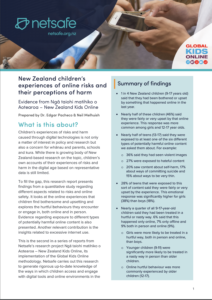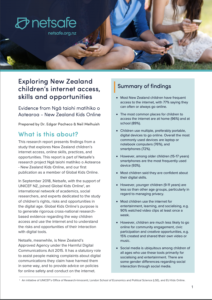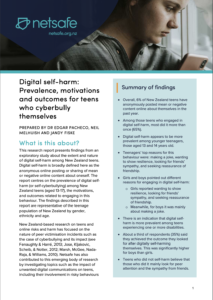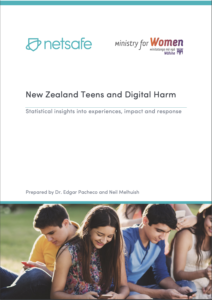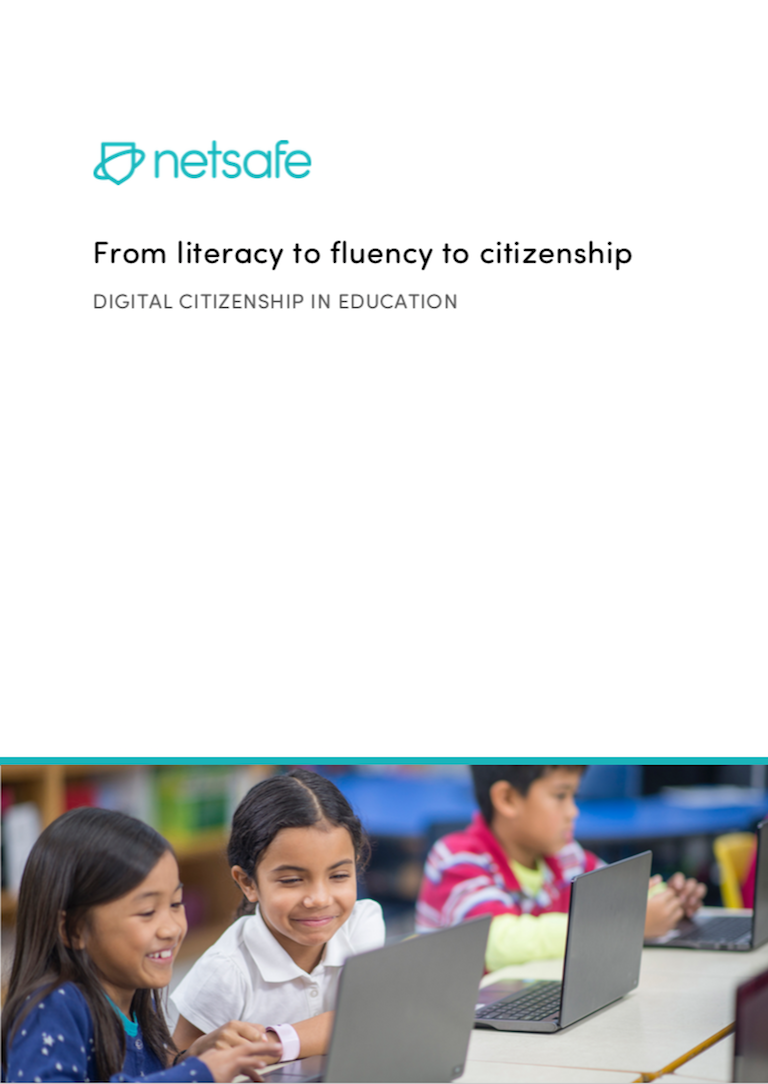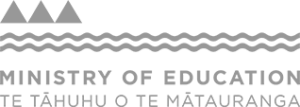Research is at the centre of the work we do. Netsafe is committed to better understand the way children and young people use digital technology and online spaces and how to reduce online harm.
Our research informs the work we do to support children and young people, their schools and their families as they navigate the complexities and challenges which come from being online and connected.
This page includes links to some of Netsafe’s recent research as well as From Literacy to Fluency to Citizenship: Digital Citizenship in Education , the white paper which forms the foundations of the Netsafe Schools programme and of our services and support for schools.
Ngā taiohi matihiko o Aotearoa – New Zealand Kids Online (Feb 2020)
Our second report from Netsafe’s latest research, Ngā taiohi matihiko o Aotearoa – New Zealand Kids Online uncovers important insights about New Zealand’s children’s experiences (aged between nine to 17) of online risks and their perceptions of harm.
It provides details about a variety of topics including the online interactions kids are having with people they don’t know and how frequently they are exposed to concerning online material.
Exploring New Zealand children’s internet access, skills and opportunities (Sept 2019)
Exploring New Zealand children’s internet access, skills and opportunities provides valuable insights about the way New Zealand children interact with digital technologies. The report findings provide a ‘big picture’ view of the ubiquity and use of social media among New Zealand children.
This report is part of Netsafe’s research project Ngā taiohi matihiko o Aotearoa – New Zealand Kids Online, and our first publication as a member of Global Kids Online.
Digital Self-Harm Report (May 2019)
This research report presents findings from an exploratory study about the extent and nature of digital self-harm among New Zealand teens.
Digital self-harm is broadly defined here as the anonymous online posting or sharing of mean or negative online content about oneself. The report centres on the prevalence of digital self- harm (or self-cyberbullying) among New Zealand teens (aged 13-17), the motivations, and outcomes related to engaging in this behaviour.
New Zealand Teens and Digital Harm Report (June 2018)
The study focuses on the prevalence of New Zealand teens’ experiences with a range of unwanted digital communications in the previous year and the impact these experiences had on them, both emotionally and in carrying out everyday life activities.
It also describes teens’ responses, the effectiveness of their coping actions, and to whom they would turn for help in the future.
Digital Fluency and Digital Citizenship
Netsafe’s white paper From Literacy to Fluency to Citizenship: Digital Citizenship in Education forms our thinking on the relationship between digital capability, fluency and citizenship. This white paper underpins the Netsafe Schools programme and the services and supports we offer schools.
A person is digitally fluent if they have the skills to participate in a digital society, and is a digital citizen when they are effectively doing so.
Therefore a digital citizen is defined as somebody that has appropriate:
- Skills and strategies to access technology to communicate, connect, collaborate and create;
- Attitudes, underpinned by values that support personal integrity and positive connection with others;
- Understanding and knowledge of the digital environments and contexts in which they are working, and how they integrate on/offline spaces;
and then critically:
- They are using their ‘digital fluency’ competency to participate in life-enhancing opportunities (social, economic, cultural, civil) and to achieve their goals.
Learn Guide Protect (LGP) framework
The Learn Guide Protect (LGP) framework recognises that striking the right balance of promotion and protection activities and strategies requires schools to consider factors such as students’ ages, teacher capability and levels of community engagement.
Keen to dive a bit deeper into the latest New Zealand online safety research? Check out more of Netsafe’s research at netsafe.org.nz.



